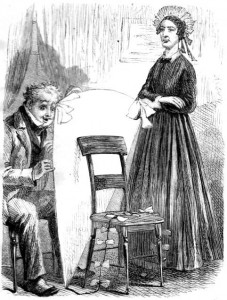Charles Dickens the psychologist
This is lovely, from the British Psychology Society's website:
Charles Dickens was born 200 years ago, yet in his understanding of mental distress he is a very modern writer, argues Caroline Cupitt.
Take David Copperfield, the novel that Dickens himself described as his ‘favourite child’. By the time David is 10, having already seen more of life than many ever do, he has run away from cruelty and thrown himself on the mercy of his eccentric aunt, Miss Betsy Trotwood. She is an exceptionally strong character who is not afraid to defy convention. She has already become the protector of Mr Dick, real name Richard Babley, who now lives with her.
David first meets Mr Dick when he is sent upstairs to convey his aunt’s compliments and ask how he gets on with his Memorial. He finds a man intently working at his desk, surrounded by papers. David notices a large kite in the corner of the room.
Mr Dick has, it seems, been working on his Memorial – a vast work whose content is never specified – for the last 10 years, but he experiences continual interference from King Charles I. He explains that some of the trouble got put out of the King’s head, after it was taken off, and into his own. Thus the manuscript is regularly spoiled.
But the ingenious Mr Dick has found a way to ameliorate this by making the spoilt pages into kites. He explains that flying them sends the facts far away and diffuses them.
When I first read this passage I was impressed. Not only had Dickens created a character who, in modern terms, might be said to experience thought insertion and delusions, he has also given Mr Dick ingenuity and a strategy for living with it.
Given that there is so little literature about psychological strategies for managing thought insertion, I was already wondering whether to suggest kite-making to my clients.
Returning to the novel, the young David, whilst finding Mr Dick likeable, wonders if he is out of his mind. In the subsequent conversation with his aunt, David’s questions represent a conventional viewpoint, which is rigorously torn apart.
Yes, she acknowledges that some have called Mr Dick mad, but she firmly declares his sanity, according madness to those who decry him. What is more, she extols his virtues, describing him as the most friendly and amenable creature in existence, on whose advice she depends.
Not content to simply state his value, Miss Trotwood proceeds to offer an understanding of him, saying that his references to Charles I are an allegory. They are a means of expressing his distress at his sister’s unhappy marriage - a distress which was compounded by the unkindness of his own brother. She acknowledges that this allegory is an unusual means of expression, but upholds Mr Dick’s right to use it.
This formulation, although not specifying the connection between Charles I and the events of Mr Dick’s life, is outlined with such warmth and loyalty that David is convinced that he can trust his formidable aunt.
It also had me wondering whether, when making formulations of my own, I pay too much attention to the details of people’s problems and not enough to their strengths and value.
When David is a grown man he is able to arrange work for Mr Dick copying legal documents . He finds he can do this providing that he returns to the Memorial whenever Charles I threatens to intrude.
Shortly after reading this passage I took on a client who was experiencing significant problems with thought disorder. I lent him a self-help book and, rather than complete the exercises, he copied out a whole chapter each week. While I could not pay him for his work, Dickens had taught me not to discourage his copying and he is now the proud owner of a handwritten book with each chapter neatly filed in order.
There is no suggestion that Mr Dick should be cured of his unusual ideas; indeed, they are never directly challenged by anyone. At first the young David finds them hard to accept, but as Mr Dick proves his worth and, most importantly, finds his place within his community, they become increasingly irrelevant.
Indeed, it is even suggested that he is able to bring about a reconciliation between Dr and Mrs Strong that someone with a more conventional mind would find impossible. As Mr Dick puts it himself: “a poor simple fellow with a craze, sir … may do what wonderful people may not do.”
By the end of the novel Mr Dick has recovered, not in the sense that his ‘symptoms’ have changed, but that they no longer define him. Miss Trotwood tells David that by using the strategy of copying documents Mr Dick can keep King Charles at a respectful distance and live his life free and happy. He is one of the novel’s heroes and an exemplar of recovery for the modern age.
Caroline Cupitt is a Chartered Clinical Psychologist who works for Oxleas NHS Foundation Trust with an Assertive Outreach Team .

